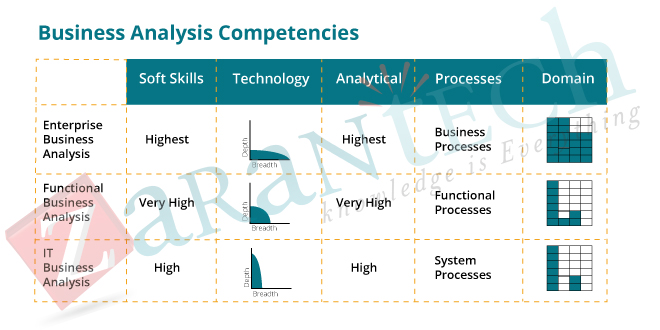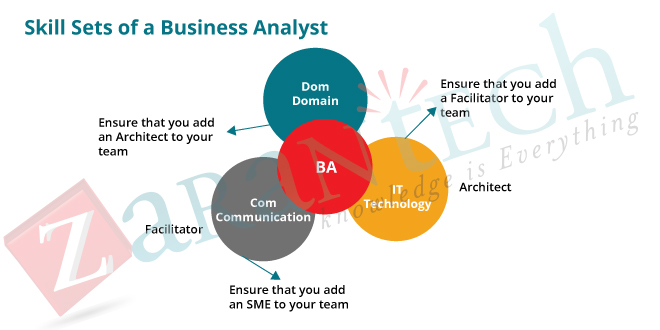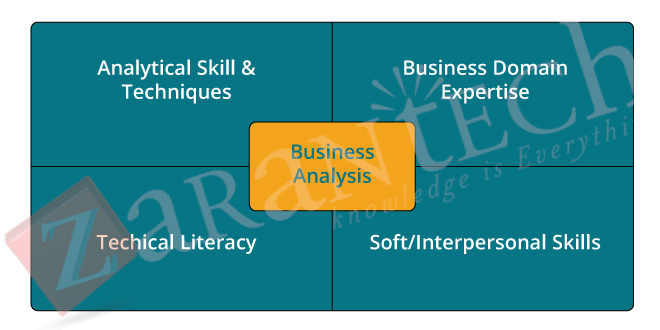How important is domain knowledge for Business Analysis
Category: Agile Business Analysis Posted:Jun 02, 2017 By: Serena Josh
A domain in this context refers to a business sector such as Manufacturing, Healthcare, Banking, Insurance, and so on and so forth. Domain knowledge points to the comprehension and understanding of the inner workings, processes, procedures and other key aspects of an enterprise. For instance, professionals seeking domain knowledge in retail banking would need to understand the transactions concerned with retail banking web applications such as fund transfers and currency conversions. The professional would also have to gain a strong foothold in back-end processes such as the process flow involving a NEFT transfer from the front end to the back end.
These are the most popular domains from the viewpoint of a Business Analyst:
- Banking, Financial Services and Insurance (BFSI)
- Manufacturing
- E-Commerce
- Online Services
- Telecommunications
Why is it important for Business Analysts?
Considering the scenario of a professional working in the Healthcare or manufacturing domain, a Business Analyst would have to constantly interact with the end users to comprehend the nature and extent of their business needs. If one understands the business processes associated with a particular domain, positive results with respect to accomplishing objectives are possible since the Business Analyst will be able to not only be able to comprehend the clear and present business needs but will also be able to anticipate unstated consumer business needs as and when the Business Analyst grasps the details of the domain’s workings. Once business requirements are completely understood, it just transforms into a matter of implementation of suggested enhancements and other improvements, thereby boosting a Business Analyst’s credibility as a relevant professional.
Learn Business Analysis and Get Certified
Domain expertise for Business Analysts
It is also important to consider what stage a BA is in terms of the professional’s career. If it is an entry level Business Analyst, then companies will not expect much from them in terms of domain knowledge. Understanding of business needs analysis, business requirements capturing and Unified Modeling Language along with SRS/FS comprehension carry a lot more weight than domain knowledge alone – when it comes to an entry level Business Analyst.
New entrants to the field of Business Analysis need not concern themselves too much with domain knowledge, but on the same note should concentrate on acquiring domain knowledge as fast as practically possible when initiating work as a Business Analyst.
But this is not the case when it comes to practicing Business Analysis, for whom domain knowledge can prove to be quite an asset, and is stipulated by companies that hire them. Domain knowledge has to be looked at as a valuation or quantification of experience and is totally irreplaceable. This is why entry level Business Analysts will never be able to replace a seasoned Business Analysis professional with considerable amounts of domain knowledge gained through work experience. It has to be kept in mind that extensive domain knowledge usually cannot be earned as a certification.
It is also worth considering the type of domain experience that one intends on acquiring, even in Business Analysis. Domain knowledge can be based on either generalization or specialization. If one needs to be an expert in a domain or will benefit more from acquiring domain knowledge as a generalist depends exclusively on the business scenario. Specialization is a great bet in scenarios where growth opportunities are plentiful in availability. A good example for this is Risk Management.
Generalization is more of a survivalist strategy for Business Analyst professionals who intend to stay unaffected by the worst of economic downturns, and staying relevant irrespective of market conditions.
In either case, Domain expertise is an added plus on several levels with regard to understanding the business environment, getting a good hold on business expectations and helps easily compare and contrast needs by the system familiarity that was gained from the domain knowledge.
It is worth noting that enterprises which have standardized and matured Business Analysis practices do not focus on domain knowledge when hiring Business Analysts. Conversely, organizations which have partially developed Business Analysis practices and frameworks which are mostly in-progress might resort to hiring Business Analysts who are domain experts to establish a sound set of Business Analysis practices to anchor the delivery of the enterprise needs.
Now, it can be argued that even when domain expert Business Analysts join companies they will take a certain amount of time to acclimatize to the work environment and processes which amount to almost the same amount of time that a generalist Business Analyst with experience would need to get a hold of the current domain practices. This argument can be extended to say that it would make more sense to place a higher priority on skill sets possessed by Business Analysts rather than the domain knowledge they come with while joining the company.
It is advisable for Business Analyst professionals to first set foot in Business Analysis to grow needed skill sets at the start, following which domain knowledge acquisition will be a natural follow-up the process when initiated into the Business Analysis field.
Example for Domain knowledge
There is a great hypothetical example to explain the importance of skill sets, domain knowledge, and both their use and application in a relevant business scenario. For instance, A Business Analyst who would be part of an analytics project sought out a robust reason to support a primary business decision, would find him/herself contributing much less then he/she would have wanted to. This is not because of the deficiency in technical abilities but a strong lack of business or industry knowledge will limit the value of the Business Analyst in this particular situation.
It is folly to think that purely technical skills would be sufficient to propel Business Analysts across a successful career. Domain knowledge in situations such as the ones mentioned above can prove to be a huge asset in project task execution for Business Analysts.
Even though technical skills help make one’s CV look better, and is in all probability the very first thing that a hiring manager would look for, to fill a vacancy, once the candidate gains entry into the company, technical skills take a backseat when compared with domain knowledge. Even if a professional knows his/her way around an Excel spreadsheet, MS Access or SQL, an application is what really counts in the end. If a professional is not sufficiently informed about his business and industry, there is not much one can do with existing technical skills.
This being said, technical knowledge is the foundation of which domain knowledge can be built to serve higher purposes in the enterprises. The most useful technical skills to a BA are the ones that allow one to execute ETL and automation activities. This is especially true when one is dealing with large datasets which are not readied for appropriate data analysis. Also essential are the technical skills that allow Business Analysts to skillfully manipulate spreadsheets or statistical software to obtain desired project outcomes. While automation and ETL help in priming data for analysis, the statistical software helps in the exploration of data and its analysis. Post this; domain knowledge will have to take over to get tasks done.
In conclusion, business domain knowledge and technical knowledge go hand in hand with an equal emphasis on both aspects necessary to achieve project success.
Switching Domains as a Business Analyst
Being the hot topic of discussion that it is, whether Business Analysts should possess domain expertise or rely mostly on BA skill sets to comprehend and work with any domain is yet to be decisively determined. It is also an established fact that experience in any domain makes Business Analysts stand out from the crowd.
While some professionals are of the belief that IT is not really a specific domain for business analysts, it is an established fact that most Business Analysts under the IIBA chapter are from IT backgrounds and also qualify for the knowledge areas listed in the BABOK. An IT Business Analyst should, therefore, have the IIBA qualified Business Analysis skills.
Domain knowledge grows with time spent on domain specific projects and it being dependent on the nature of a project that a Business Analyst is found to be working with. This begs the question if it is really important for a Business Analyst to focus on a specific domain or if it makes more sense to switch between domains. But the counter argument to switching domains within the Business Analyst profile is that switching to another domain more often than not proves to be fraught with difficulties and would require an inordinate amount of time and effort to be spent to make any headway. And as for finding jobs, BAs would sometimes find it to be near impossible to make it through the pile of profiles that a hiring manager would have to go through while choosing a suitable candidate.
To get through a domain switch, it is recommended for Business Analysis candidates to undertake a considerable amount of paperwork to list down the domains available in their current enterprise. Post this step, Business Analysts can interact with professionals already working in different domains to gain necessary insights. One can self-invite oneself to routine meetings assessing the current situation in a project, along with regular meetings such as SCRUM, stand-up meetings and a whole lot more. This can greatly accelerate the acquisition of domain knowledge
Using application products will always aid in comprehending the details involved in the application concerned. For instance cell phones around ten years ago were plain and simple, with basic features, but fast forward to the current situation, any application is downloadable on smartphones that are widely available across the world. And the use of such smartphones did not require any special medium of instruction, but only the natural passage of time with which users learned to tap into all the features available in their smartphones which are so ubiquitous these days. Business Analysts can gain domain specific experience in a similar manner with its application being understood with great ease. This is analogous to the ever popular concept of reverse engineering.
An inquisitive nature and a natural curiosity for new ways to solve problems can prove to be a great asset to a BA. The more questions asked, the clearer the concept of the application becomes, enabling the gathering of further information. This can also be coupled with the interviewing technique under knowledge area elicitation.
To enquire within business logic is a good habit as compared to just observing it. Tracing the exact reasons which back product implementation will enhance knowledge in almost any domain. It is also suggested to improve the learning in Knowledge areas of Business Analysis which in turn can aid a Business Analyst in gaining knowledge in other existing domains.
Gaining Domain Knowledge as a Business Analyst
Critical Business Analysis skills such as need capturing, the creation of use cases, conducting interviews and related query sessions are of paramount importance to project success. Domain knowledge also plays a key role in functioning as an active contributing factor in projects. Most such business analysis skills are transferable between domains. One also has to remember that domain expertise tends to be subjective to the type of project under way.
Now while doing a simple migration project of a rating database from IMS to DB2 or Oracle may not necessarily require a Business Analyst to be a domain expert. But if a professional had a project which included an underwriting related rules changes, data analytics of region wise premiums or the migration of a legacy application, one may need to be an Insurance domain expert.
Such a fact is not usually regarded by most HRs who filters CVs for job postings. Once the HR sees that the CV does not contain a particular domain, the chances of being invited to an interview are pretty low, irrespective of the quantum of expertise that one possesses in terms of Business Analysis skills. While this is deplorable, it is, in fact, the current state of corporate recruitment, especially wrt Business Analysis.
Want to know More about Business Analysis? Click here
How does one gain domain expertise?
Acquisition of domain expertise is a gradual process that happens over an extended period of time as a progressive process. Some Business Analysts are known to acquire domain knowledge through the testing of business applications and working hand in hand with business users. They tend to generate a conducive learning environment through the use of extensive interpersonal and analytical skills. In a few cases, Business Analysts are also known to augment their domain knowledge by using certifications that are provided by AICPCU/IIA and LOMA in the fields of Financial and Insurance services. Other certification authorities exist which offer certifications in other domains.
How to start working on a new domain?
Business Analysts that excel at their work usually have an analytical bent of mind and an approach that complements such a mindset. This character trait can in itself be considered as a strong tool in the learning of the new domain. It is best to consider the following points when you as a Business Analyst will start working on a new domain.

- Thinking like a business user
When a professional starts working in the specific domain, it is advisable to align one’s thought patterns in line with the users. For instance, a sales rep of insurance firm would have to get into the shoes of an insured customer to anticipate the kind of problems they would face while using the insurance product. A Business Analyst at a mutual fund advisory firm will need to think about a client’s financial profile before anticipating their customer’s inhibitions regarding price points in stock holding and so on and so forth.
- Act like a business user
It is best for a Business Analyst to get involved with the application in question as much as possible. This can be implemented by making use of developer access to the application to play around with and explore the application. All scenarios that the customer may come across have to be considered such as exception path, happy path, etc.
- Sympathize with business user
In order to relate to a user on their level one as a Business Analyst will have to ask questions, find out where the pain points lie and sympathize with the business users with respect to the system limitations that the users are facing. These can act as a portal to harness potential opportunity for application enhancement.
- Ask questions and keep a log
Now, while asking a lot of questions is a smart move, it is also important to record all questions that have been queried, the responses that have been received and establish a personal knowledge base of sorts for the application
Conclusion
To conclude, even though domain knowledge is really essential when considering aspects of the business analyst skill set, it is not completely imperative as most Hiring managers already think, especially when it comes to a few specific projects. Domain knowledge would have to be called to the fore only when the project is of great complexity, needing drastic changes to be applied to existing business processes that include advanced data analytics which is concerned with domain- specific data. Therefore Domain knowledge and technical expertise go hand in hand while building a successful career as a BA.
I hope that by now you have had an overview of Business Analysis. Before you enroll in ZaranTech’s certification course on Agile Business Analysis do check out this demo video:





 99999999 (Toll Free)
99999999 (Toll Free)  +91 9999999
+91 9999999